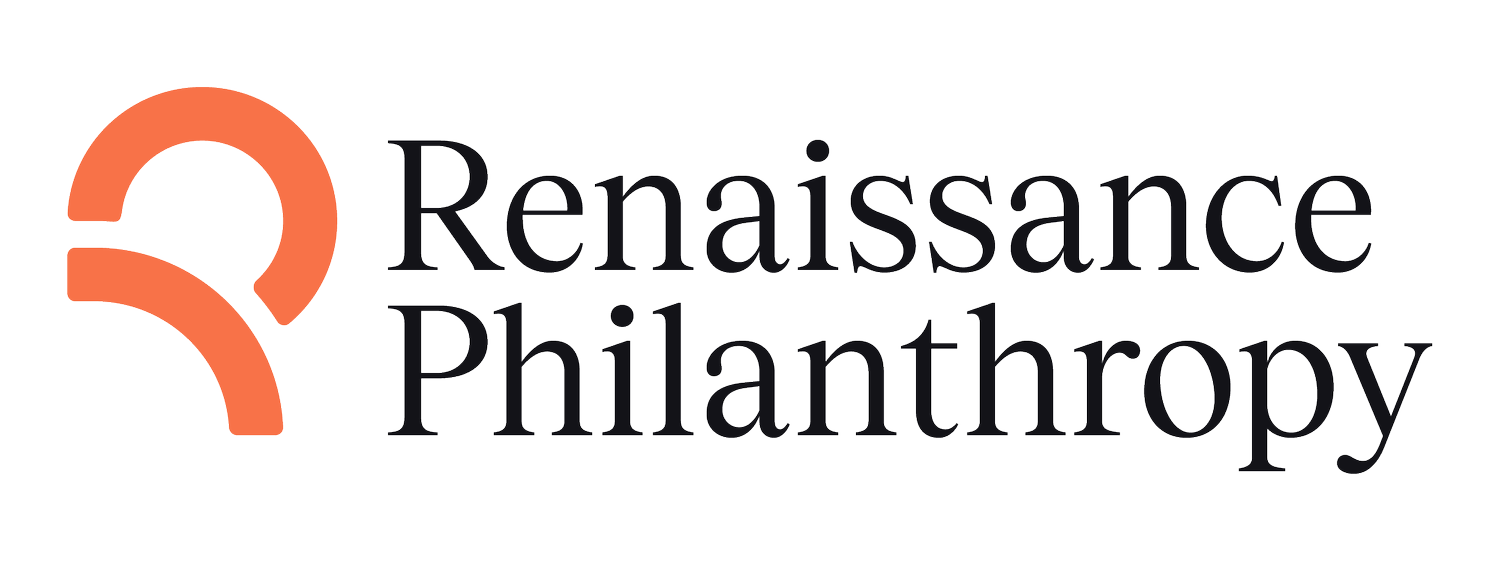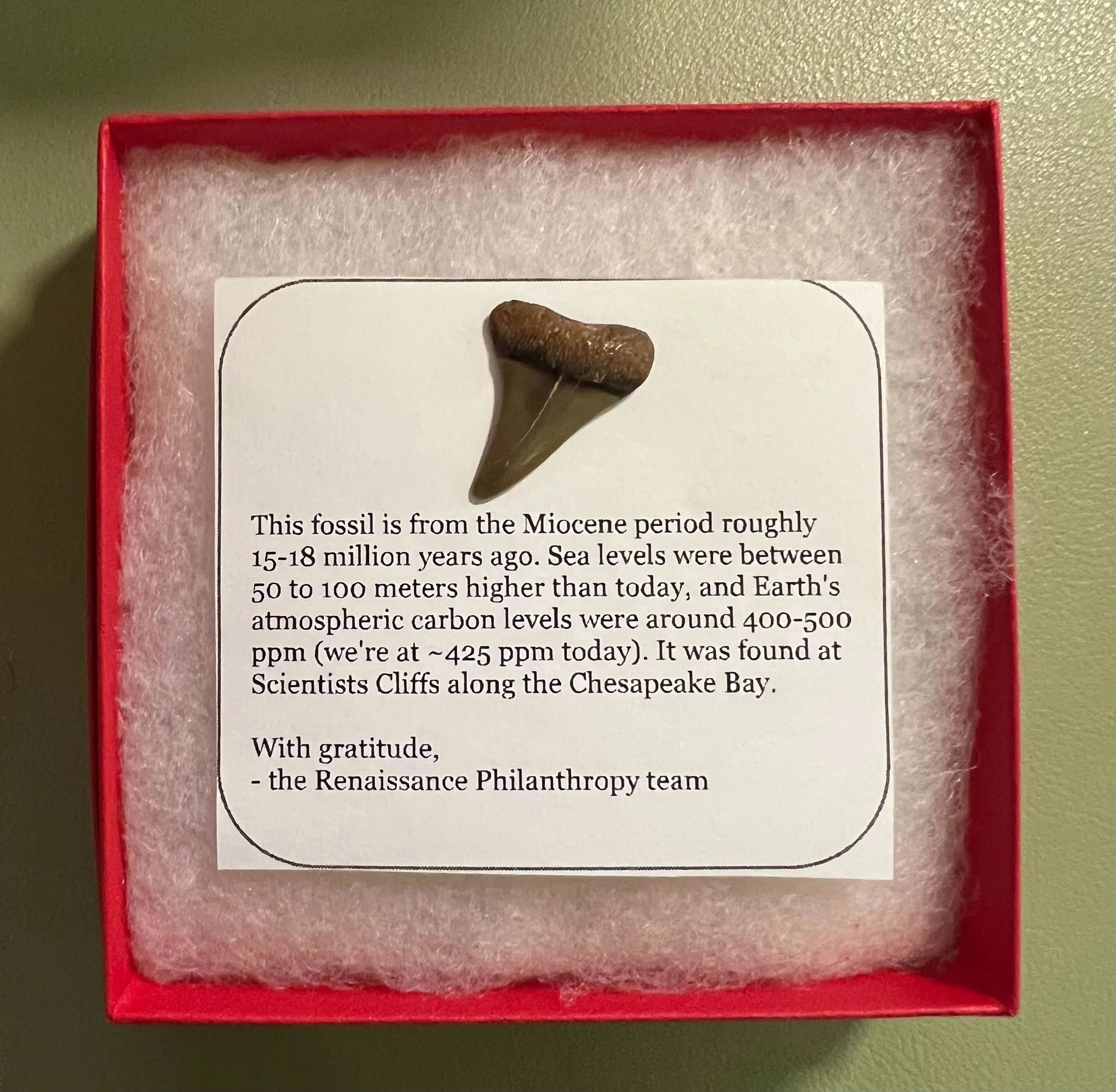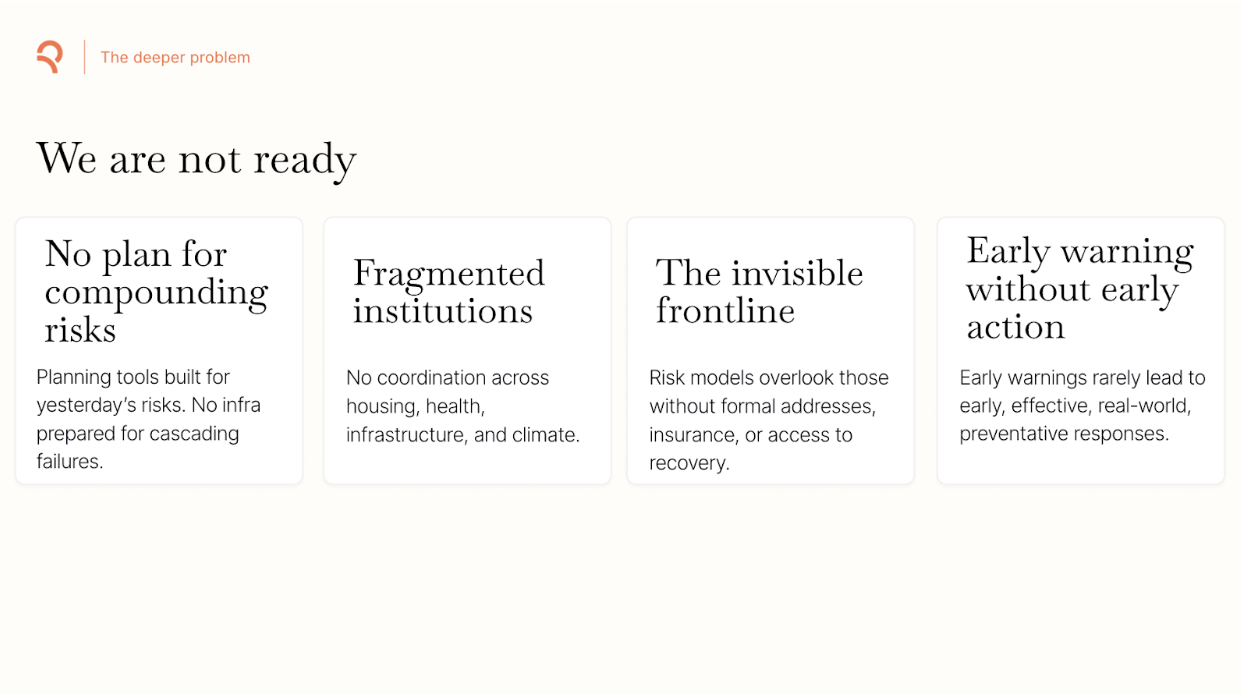Urgency and Opportunity: The Next Generation of Climate Solutions
Looking back on the recent New York Climate Week, our mission to fuel a 21st century renaissance by increasing the ambition of philanthropists, scientists, and innovators, feels more relevant than ever. Climate week is always a time of intense engagement and insightful conversations, but this year’s reinforced our team’s belief that we stand at an inflection point – one that demands bold philanthropic leadership to unlock new climate solutions.
The Hard Truth
There is a growing acceptance among climate modelers that the 1.5°C pathway for our climate has closed. Current projections point us toward a 2.5°C or higher world, and climate overshoot isn't just about higher temperatures; it unlocks the very real possibility of tipping points in Earth’s systems, like runaway methane release from permafrost, ocean current instability or collapse, permanent Amazon dieback, or ice sheet collapse and catastrophic sea level rise, along with unpredictable feedback loops that could ultimately push us into "Hothouse Earth" territory.
We cannot assume climate change is on a linear path – and we need solutions for that possibility. This clear-eyed recognition of our current climate moment requires a shift in our collective approach. While we must continue to make progress on decarbonization and improving resilience to climate change, we have to also accept that these efforts may not be enough on their own.
The Role of Renaissance Philanthropy in Securing a Safer Climate Future
That’s why our strategy in this area centers on three core principles:
Big If True Bets: We want to develop and bet on transformational opportunities that could truly bend global climate curves – investments that, if proven, change the trajectory of entire sectors or regions. This week reinforced our conviction that we need bolder bets.
Strategic Neglectedness: We focus where markets and governments won't currently go, and overlooked frontiers where philanthropy can de-risk early work and unlock entirely new capital pathways. The most promising breakthroughs often emerge from spaces that institutions overlook.
Catalytic Impact: We target the critical levers such as data, finance, regulation, coordination, that can collapse decades of scaling into years.
Our Principles in Action
In the run-up to climate week, the Advanced Research for Climate Emergencies (ARC) team, a Renaissance Philanthropy program focused on addressing catastrophic climate risks, published a series of updates and big ideas on the next phase of climate action, including:
A Theory of Change for a Post Degrees World; arguing for a new fourth pillar of climate action: prevention – aimed at directly addressing and averting cascading system failures, noting the aerosol “unmasking” shock post-2020 as a case study in institutional blind spots, and laying out ARC’s mission.
A new report and first-of-its-kind analysis on reflooding ancient inland basins to counter sea level rise;
The case for responsible research into arctic stabilization to mitigate impending arctic tipping points;
A new joint report from the Climate Emergency Resilience Lab exploring opportunities to strengthen human resilience to cascading climate shocks; and
A round-up of our Climate Emergencies Forum learning sessions and coalition building grants over the last 6 months, laying the groundwork for a workshop with partners held at climate week.
Throughout Climate Week, we put these principles into practice through a series of strategic convenings designed to advance our thesis, that we need a fundamentally expanded approach to climate action.
We co-hosted a philanthropic activation dinner with Outlier Ventures, The Navigation Fund, and the Bernard and Anne Spitzer Charitable Trust, bringing together nearly 100 funders and partners to explore novel approaches to tackle major climate challenge areas and catastrophic climate risks that the world is currently unprepared for.
The evening underscored an urgent reality: the traditional pillars of climate action — mitigation, adaptation, and carbon removal — must now be joined by a fourth pillar addressing catastrophic climate risks: prevention, an emerging field focused on advancing the science and policymaker options for intervening to stop irreversible climate system cascades before they begin, and on preventing worst-case outcomes.
We offered our dinner guests hand-picked fossils from the Miocene period – a pocket-sized parable.
We held our first Climate Emergencies Forum (CEF) workshop for this year. We launched the CEF earlier this year to create a convening and knowledge-sharing platform to help inform and coordinate action on catastrophic climate risks.
The workshop had over 50 CEF partners, including the six frontline and youth-led climate organizations in our inaugural grantee cohort. We’ll share more on what we learned from the workshop soon, but in the meantime here are some thoughts from Paul Gambil on the need for more backbone infrastructure of the kind we’re trying to build with CEF. (give him a follow while you’re at it!)
Our team shared some level-setting at our first CEF in-person workshop.
We co-hosted an event to launch the Climate Emergencies Resilience Lab, and released our new report, Breaking the Cascade of Climate Risk, which maps how cascading hazards intersect with food, water, health, and infrastructure. The report distills 60+ scouted ideas into 10 venture-, research-, and nonprofit-ready opportunities designed to reduce derailment risk, catalyze private investment, and build antifragile human systems at scale.
Last but not least, we hosted a breakfast for women in philanthropy, as an effort to galvanize more interest in how women in the science and philanthropic space can play a larger role building an equitable and safer climate for everyone.
These events are just scratching the surface of what our team has been up to this year – you can find a comprehensive list of our climate programs on theARC website. Beyond these, we’re currently scoping funds in fire resilience, industrial decarbonization and geologic hydrogen. We welcome partners to join us in any of these areas.
Looking Ahead
The conversations we had enforced our belief that where markets demand near-term returns and governments need new options, philanthropy has a clear role to play by unlocking the responsible solutions and new possibilities society needs to have a chance at securing a safe climate future. We're designing time-bound, thesis-driven funds to back climate breakthroughs that can meaningfully alter the status quo.
From Arctic tipping point prevention to Amazon wildfire resilience, from geologic hydrogen to industrial decarbonization frameworks, our portfolio represents a coordinated effort on major climate challenges across multiple fronts.
After New York Climate Week, our commitment is clear: we will continue to fuel the bold, neglected, and catalytic interventions needed to prevent climate catastrophe. The 21st-century renaissance our planet needs demands the courage to bet on breakthroughs that could change everything.


